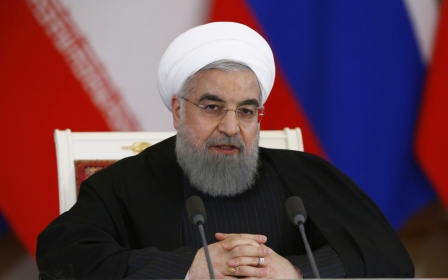Tehran and Riyadh preparing diplomat visits, says minister

Iran and Saudi Arabia will exchange diplomatic visits soon, Tehran said on Wednesday, indicating a possible thaw in relations between the regional rivals since they severed diplomatic ties last year.
Iran's foreign minister, Mohammad Javad Zarif, told the Iranian Students’ News Agency (ISNA) that the visits could take place after the Hajj pilgrimage ends in the first week of September.
"The visas have been issued for both sides to make this trip," Zarif said, according to ISNA. "We are waiting for the final steps to be completed so diplomats from the two countries can inspect their embassies and consulates.
"Visits will probably take place after Hajj."
We are waiting ... so diplomats from the two countries can inspect their embassies and consulates
- Mohammad Javad Zarif, Iran's foreign minister
Relations between Iran and Saudi Arabia have been at their worst in years, with each accusing the other of subverting regional security and supporting opposite sides in conflicts in Syria, Iraq and Yemen.
Iranian protesters stormed the Saudi embassy in Tehran in January 2016 after a prominent Saudi Shia cleric was executed, prompting Riyadh to close the embassy.
Saudi Arabia and several other Arab governments have severed ties with Qatar, citing its support of Iran as one of the main reasons.
Iran has blamed Saudi Arabia for orchestrating deadly twin attacks on 7 June in Tehran claimed by Islamic State.
At least 18 people were killed and more than 40 wounded in the attacks, in which Riyadh has denied any involvement.
Thousands of Iranian pilgrims are currently undertaking the Hajj pilgrimage in Saudi Arabia.
Iran's deputy foreign minister, Jaberi Ansari, said on Wednesday that there was a need for unity between Islamic countries in the region, reported Iranian news outlet Mehr.
Ansari reportedly said that the threats of "the Zionist regime and terrorist groups can be eliminated through unity and integration of all Islamic religions and neighbourings countries".
Stay informed with MEE's newsletters
Sign up to get the latest alerts, insights and analysis, starting with Turkey Unpacked
Middle East Eye delivers independent and unrivalled coverage and analysis of the Middle East, North Africa and beyond. To learn more about republishing this content and the associated fees, please fill out this form. More about MEE can be found here.




